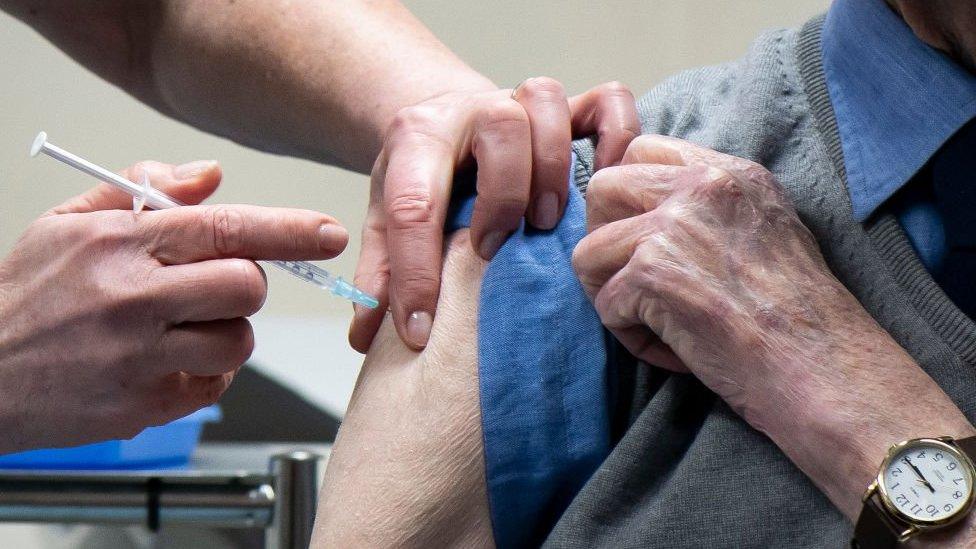Covid vaccine Q&A: Health minister answers your questions
- Published
On average, Wales is vaccinating a higher rate of population per week than other UK nations
More than 10% of people in Wales have now received a Covid vaccine.
The Welsh Government failed to meet its pledge to vaccinate 70% of over-80s by last weekend, blaming the poor weather.
But Wales, on a weekly average, is now vaccinating a higher rate of population than any other UK nation.
On Friday, Public Health Wales reported that 362,253 people have now had their first dose.
We asked for your questions about vaccinations and put them to Health Minister Vaughan Gething.
Here are his answers.
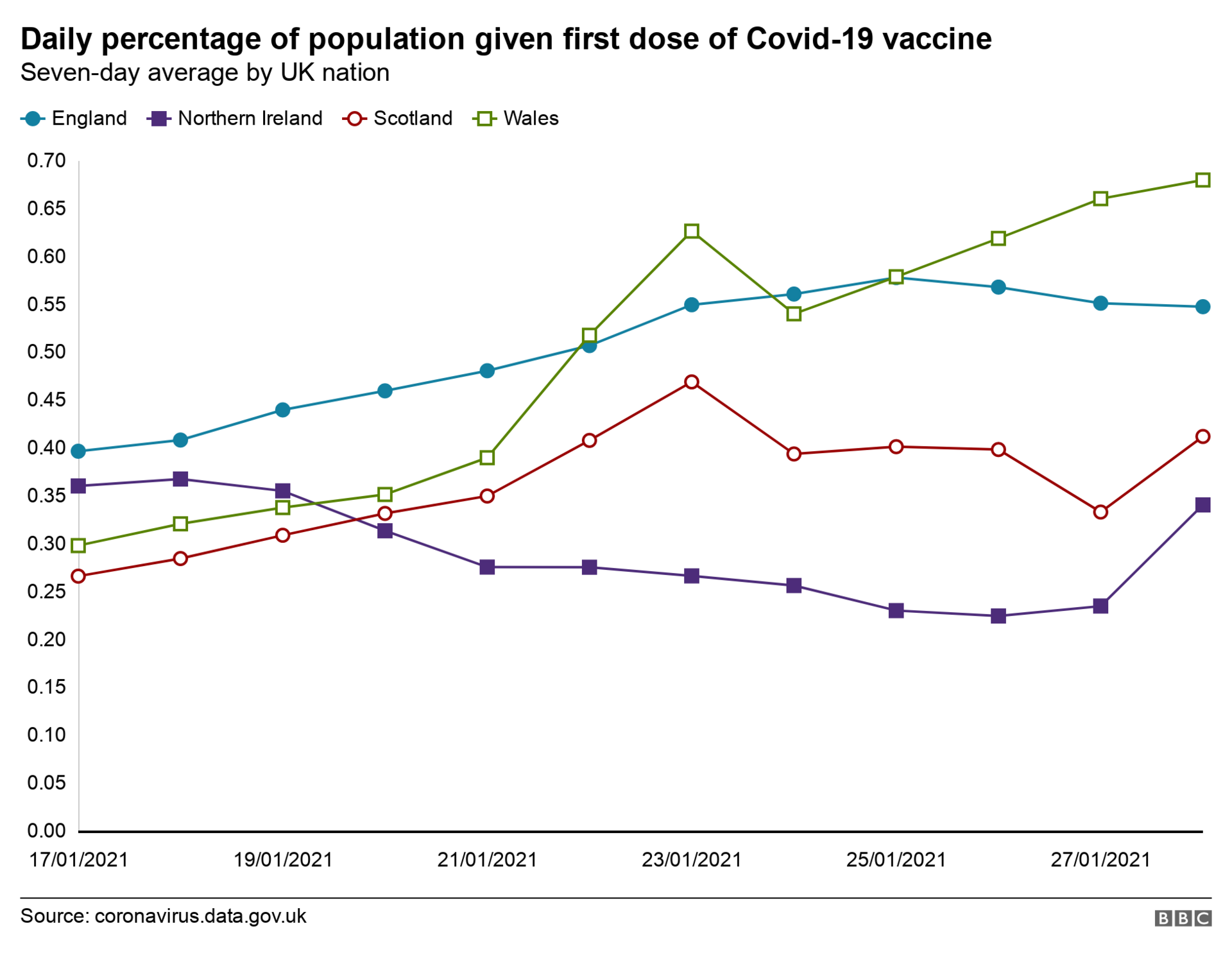

Have you had the vaccine?
"Nope. I am not due to get the vaccine yet. I might be in group six because I have an underlying health condition - a chronic kidney condition I had when I was 19 - so I get the NHS flu jab every year.
"So, broadly those people are going to be in priority group six, so I will get my jab when it is my turn just like everyone else."
Do I have a choice between the Oxford Astra-Zeneca or the Pfizer vaccine when it's my turn for the jab?
"It is not a matter of choice between the vaccines, we have two highly effective vaccines. The NHS will call you for your turn."
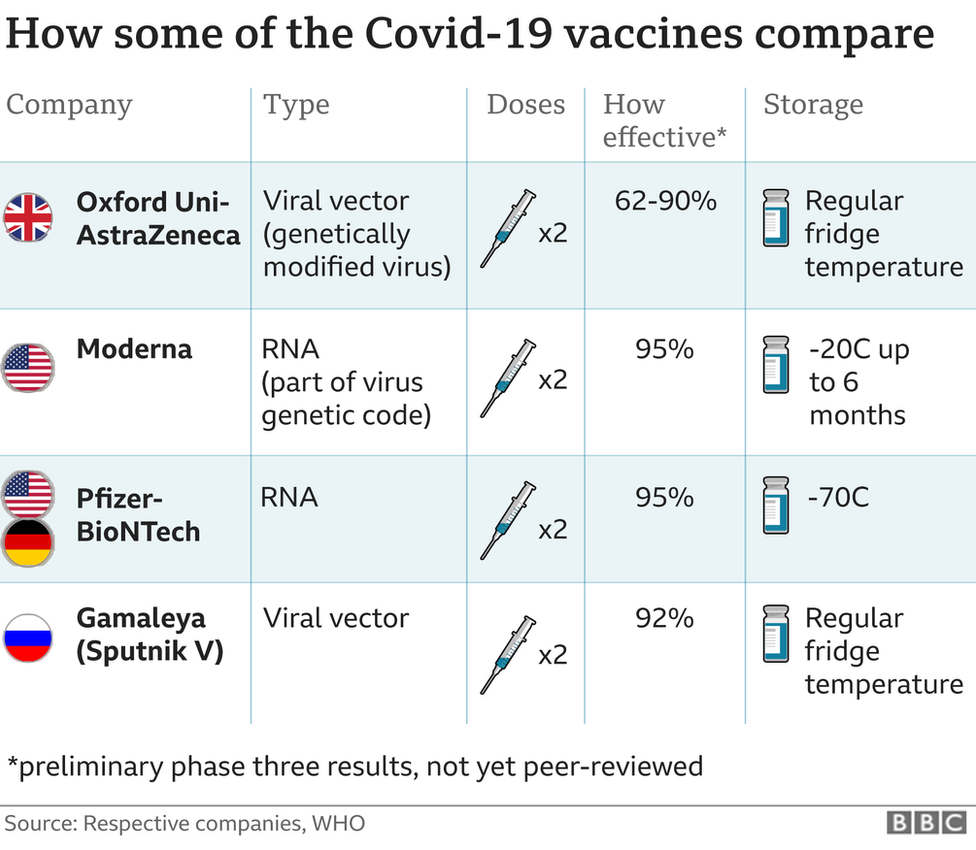
Two full doses of the Oxford vaccine gave 62% protection, a half dose followed by a full dose was 90% and overall the trial showed 70% protection.

How long will it be before enough people are vaccinated for life to return to normal?
"I don't think it is as simple as that unfortunately.
"We do think that once we have vaccinated a significant number of the population, in particular most vulnerable groups one to nine, with both their shots, we can start making some different choices."
Mr Gething said it was still possible to transmit the virus once you have the vaccine and it needed to be "clear that the virus won't have the ability to spread in the way that it does and cause harm".
"It should mean though that, through the rest of the summer, if we all do the right things, we will be able to make more choices about how we live life here in Wales and indeed the rest of Britain."
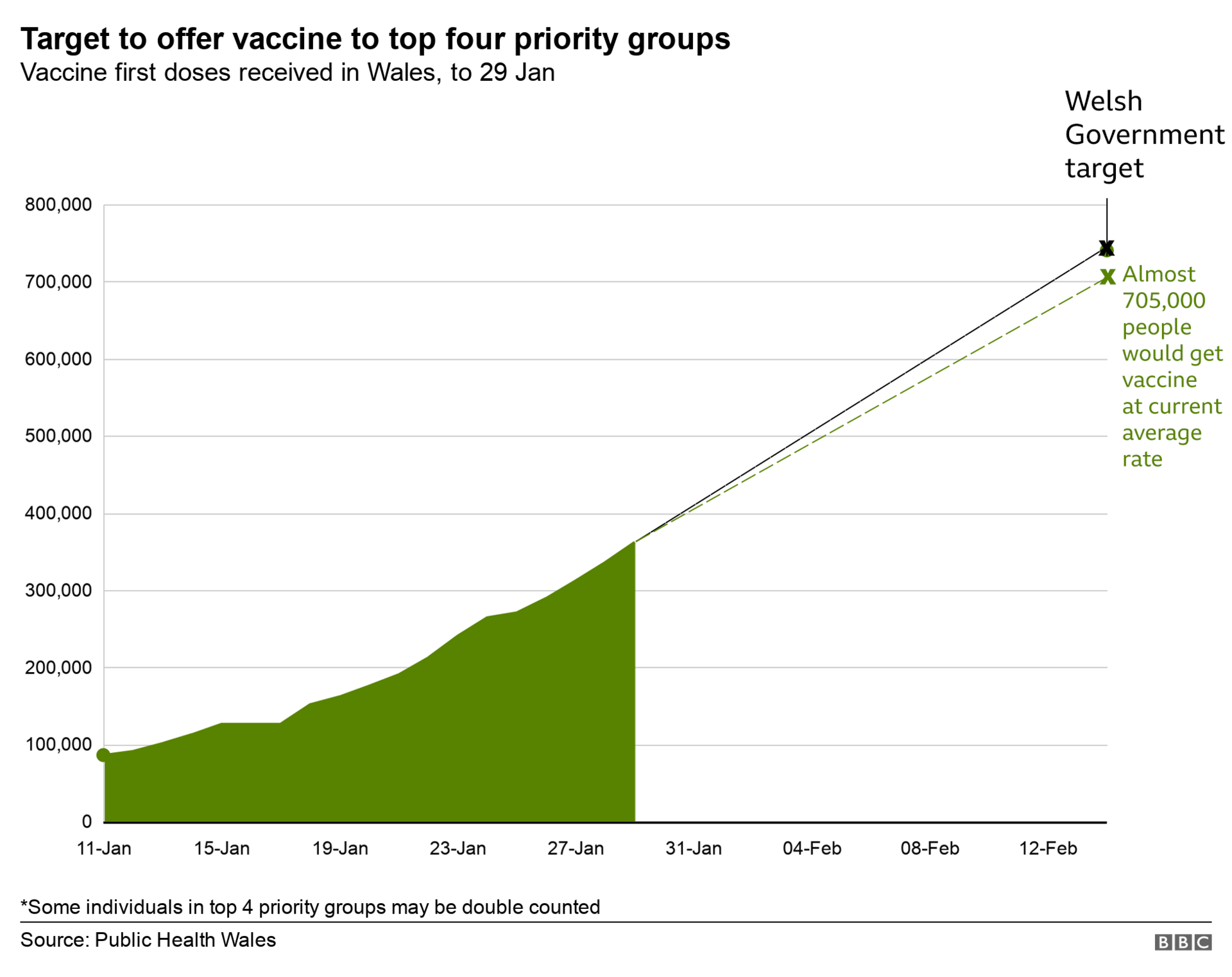

Is the call for vaccinating over-80s done alphabetically?
"No, this will vary from one GP to another. They know their patients, they will be working through that list in order of their priority.
"Some have managed to do risk assessments, some are doing it randomly and some are doing alphabetically.
"The key thing is for all of this to happen quickly."
What is the plan for people who cannot leave their home to get the vaccination?
"We have a range of different ways to do that - some GPs can deliver some of that mobile vaccination, so for example care homes are being vaccinated as a priority.
"We also have a range of mobile vaccination teams in Wales who are going out to people who are housebound.
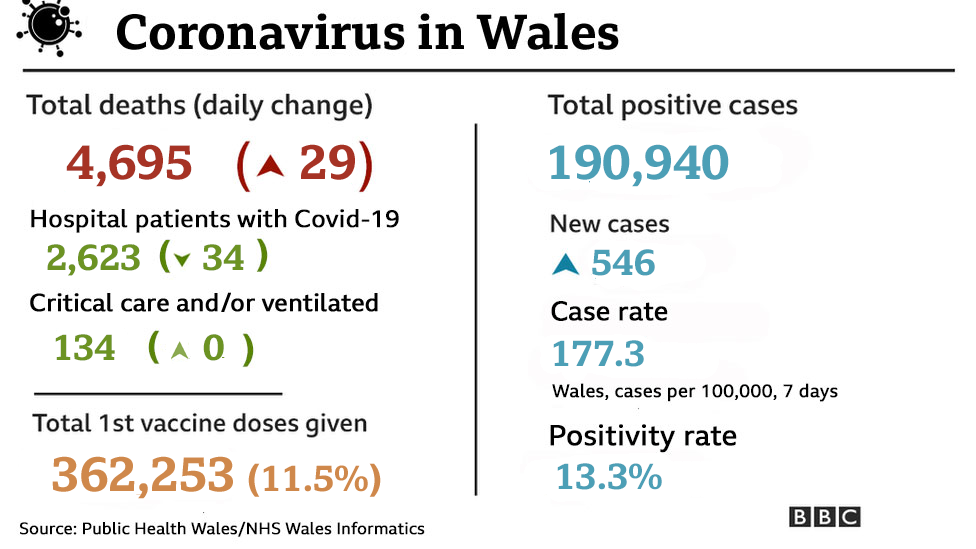
"That is important for us because a number of people can't get out and about and we don't want those people having to try and make the journey out to a vaccination centre.
"Between what GPs know about their patients and what hospitals know about their patients, we should be able to identify those people."
Why is my husband offered a vaccine jab in our local GP surgery, three miles away, while I must travel 25 miles to Brecon?
Mr Gething said it was currently a "mixed model but broadly it will get more and more similar" because the vaccine was delivered by multiple healthcare professionals, such as pharmacists, dentists and optometrists.
"What we ask people to do is to please go to where they're asked to go for their appointment that'll be the quickest way to work to everyone."
What are the government's definitions of spring and autumn for rollout? Does this mean all adults will be offered a jab by autumn, or actually given one?
Mr Gething said the vagueness about seasons and no hard deadline were "because we don't have all of the things nailed down about vaccine supply and when that's definitely going to come to us".
He said a hard date would "give people a level of false assurance" and that it was difficult because he knew that people were "anxious and worried".
"When we talk about spring, we're not trying to stretch spring into June and July, and autumn is September, October, November, so within that window, we think will have covered everyone in the adult population to have been offered their vaccine."
He added that the coverage by this point would not be "100%" because of people unable to make their first vaccination attempt, having to rearrange or refusing the vaccine.
"Some people, for whatever reason, will refuse, but if enough of us get the vaccine, it will make a huge difference in terms of saving lives," he said.
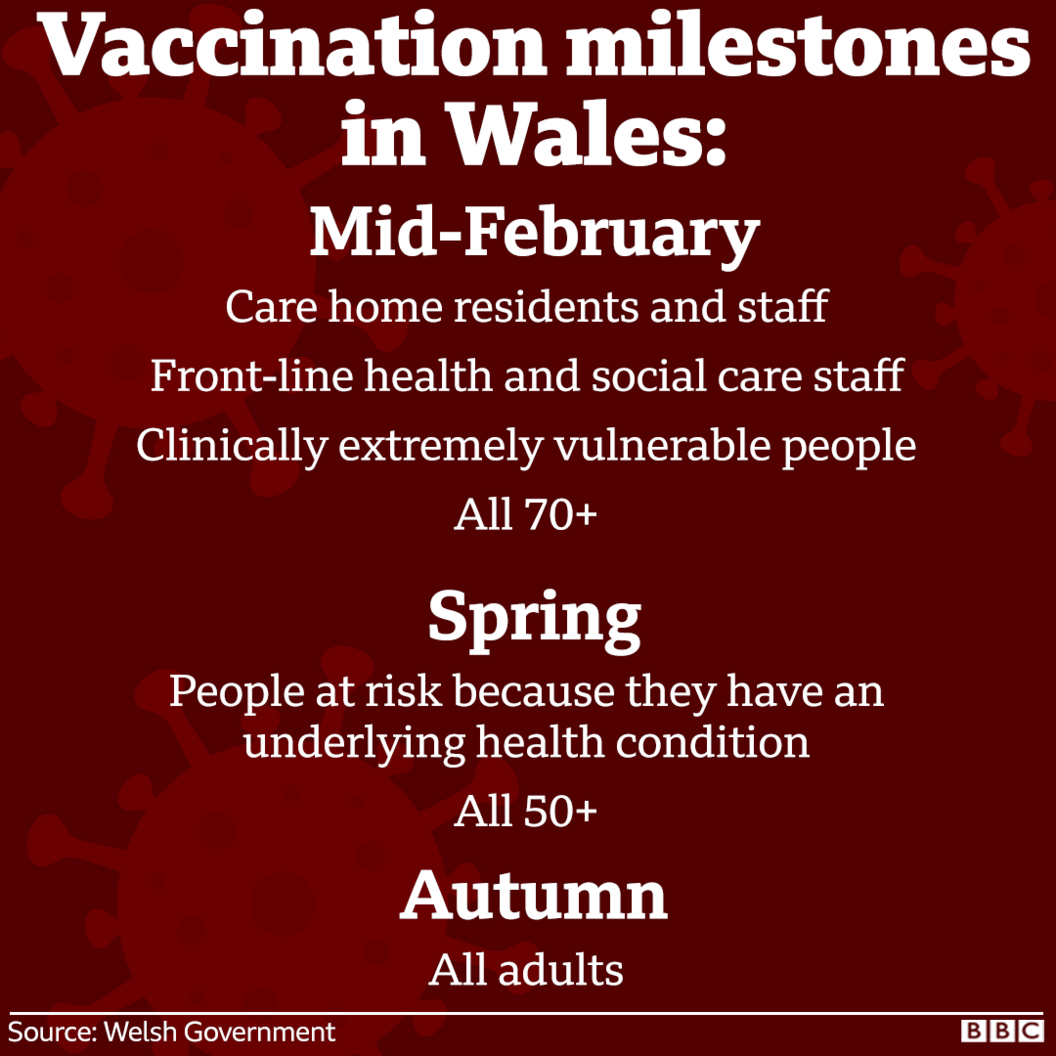

My parents have had the vaccine. Why are they expected to stay at home and behave as if they have the virus?
"Even after you've had the vaccine you can still potentially transmit the virus to someone else and also you've got to wait up to about three weeks to get the effective protection from your first shot as well; and then, of course, there's a second dose you'll get to give you the maximum protection that the vaccines provide so it's partly about the risk to you.
"When you start to benefit from the protection of the vaccine it's also about the potential for you to still get coronavirus but to not suffer great harm, but you could give the virus to someone else who could suffer great harm as well."
I live in England but on the border of Wales. Being registered with a GP in Wales, will I come within the Welsh vaccination programme, or will I be invited to a vaccination centre in England?
"We're working through this with colleagues in England. There's been a little uncertainty and it's partly about liability insurance cover as well, but we're trying to do everything possible.
"If you're registered with the Welsh GP then we'll offer you the vaccine, and if you're someone who lives In Wales but are registered with an English GP and they won't vaccinate you, then we will.
"We're working through that with colleagues, getting them to try to make this as seamless as possible, so you shouldn't need to worry about whether the NHS in Wales offers you the vaccine or the NHS in England - either way you'll get your vaccine."
I am due my second vaccine dose. What happens if there is no stock?
"So the window [to have the second dose of the vaccine] isn't a hard window in the sense that, if it isn't delivered before 12 weeks, then it won't be effective.
"In fact, in terms of the Oxford-AstraZeneca vaccine, the longer the gap between the first and second dose it delivers a greater level of protection, ultimately in any event.
"We don't think there are going to be, at this point in time, vaccine supply problems."
Why do you think Wales has been hit so hard in terms of Covid cases, especially in areas like the south Wales valleys?
"The reality is you're more likely to suffer harm if you're older and if you have underlying health conditions and Wales, compared to England, we have an older population, we have a less well-off population, and a population with more public health challenges, so we're not as healthy overall as a population.
"If you have a map of where our least well-off communities live and where our biggest health inequalities are, they neatly overlay each other.
"So actually, that's part of the reason why we need to get on with the vaccination program, in the people we're vaccinating we're disproportionally getting to people at the greatest level of risk, we're protecting people at the greatest risk of harm.
"So, sadly that's why valleys authorities have had a really high amount of people who have been ill and people who have died.
"On a guess for the future, because there may be other pandemics in the future, the healthier we are as a population, the more likely we are to have a better outcome."

Find out how the pandemic has affected your area and how it compares with the national average:
If you can't see the look-up click here., external
The postcode search has been updated to replace data for health boards in Scotland with data for local councils. In England, data for county councils has been replaced with data for district councils. Figures for boroughs and unitary authorities remain unchanged.


A SIMPLE GUIDE: What are the symptoms?
IN-DEPTH: Coronavirus pandemic
VACCINE: How will the UK deliver the jabs?
IMMUNISATION: Which Covid vaccine is best?

- Published27 January 2021

- Published27 January 2021

- Published2 February 2021
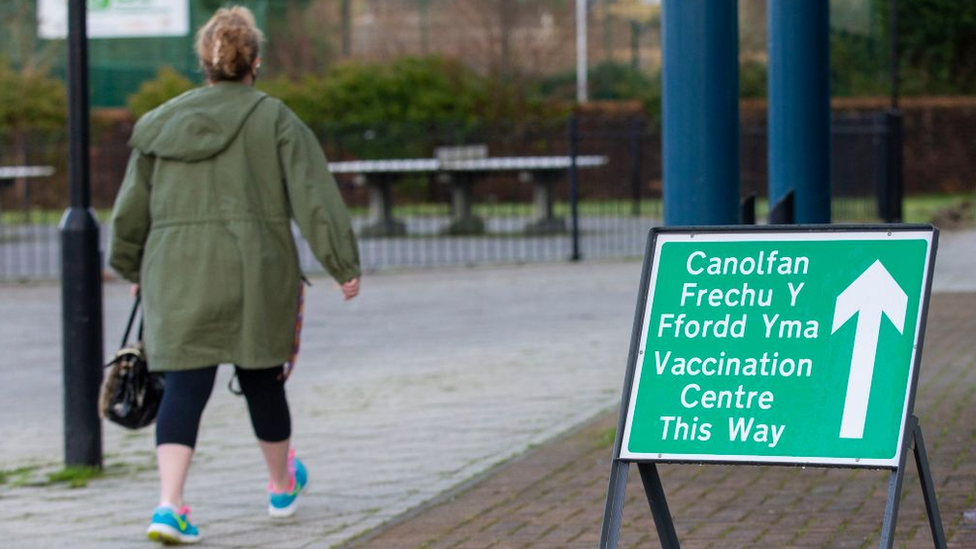
- Published10 February 2021
